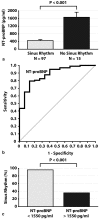Baseline NT-ProBNP level predicts success of cardioversion of atrial fibrillation with flecainide
- PMID: 25884086
- PMCID: PMC4352147
- DOI: 10.1007/s12471-015-0659-8
Baseline NT-ProBNP level predicts success of cardioversion of atrial fibrillation with flecainide
Abstract
Background: Patients with acute-onset symptomatic atrial fibrillation (AF) can be treated with flecainide. However, flecainide may induce arrhythmias and/or exaggerate heart failure. Therefore, validated markers to predict the efficacy of flecainide and prevent adverse effects are required. We hypothesised that lower NT-proBNP plasma levels correlate with higher success rates of cardioversion with flecainide in patients with AF.
Methods: In this prospective single-centre study, we included 112 subsequent patients with acute-onset (< 24 h) symptomatic AF. Patients with symptoms of heart failure and ECG signs of ischaemia were excluded. Baseline laboratory measurements, including NT-proBNP, were done. Echocardiograms were performed ~ 2 weeks after restoration of SR.
Results: Cardioversion with flecainide was successful in 91 patients (87 %). NT-proBNP was lower in patients with successful cardioversion (P < 0.001). Logistic regression indicated NT-proBNP as an independent predictor of successful cardioversion. A cut-off NT-proBNP value of 1550 pg/ml provided optimal test accuracy to predict successful cardioversion.
Conclusion: In patients with < 24 h of symptomatic AF, NT-proBNP levels up to 1550 pg/ml correlate with high success rates (94 %) of cardioversion with flecainide. Conversely, NT-proBNP higher than 1550 pg/ml correlates with poor success rates (36 %). Further research is needed to validate the predictive value of NT-proBNP for successful cardioversion with flecainide.
Figures

Similar articles
-
NT-ProBNP predicts rhythm stability after cardioversion of lone atrial fibrillation.Circ J. 2008 Jun;72(6):921-5. doi: 10.1253/circj.72.921. Circ J. 2008. PMID: 18503217 Clinical Trial.
-
Predictive Value of N-Terminal Pro B-Type Natriuretic Peptide for Short-Term Outcome of Cardioversion in Patients with First-Diagnosed or Paroxysmal Atrial Fibrillation Presenting to the Emergency Department.Biomedicines. 2024 Dec 19;12(12):2895. doi: 10.3390/biomedicines12122895. Biomedicines. 2024. PMID: 39767800 Free PMC article.
-
Candesartan, NT-proBNP and recurrence of atrial fibrillation after electrical cardioversion.Int J Cardiol. 2009 Jan 9;131(2):234-9. doi: 10.1016/j.ijcard.2007.10.028. Epub 2008 Jan 16. Int J Cardiol. 2009. PMID: 18201783 Clinical Trial.
-
Relationship between brain natriuretic peptides and recurrence of atrial fibrillation after successful direct current cardioversion: a meta-analysis.Pacing Clin Electrophysiol. 2014 Nov;37(11):1530-7. doi: 10.1111/pace.12477. Epub 2014 Aug 12. Pacing Clin Electrophysiol. 2014. PMID: 25113607
-
Relationship between Brain Natriuretic Peptide and Recurrence of Atrial Fibrillation after Successful Electrical Cardioversion: an Updated Meta-Analysis.Braz J Cardiovasc Surg. 2017 Nov-Dec;32(6):530-535. doi: 10.21470/1678-9741-2017-0008. Braz J Cardiovasc Surg. 2017. PMID: 29267617 Free PMC article. Review.
Cited by
-
Acute atrial wall stretch and the efficacy of flecainide-induced conversion of atrial fibrillation.Neth Heart J. 2015 Mar;23(3):180-1. doi: 10.1007/s12471-015-0661-1. Epub 2015 Feb 20. Neth Heart J. 2015. PMID: 25884085 Free PMC article. No abstract available.
-
Levels of Plasma N-terminal Pro-brain Natriuretic Peptide and D-dimer on the Prognosis of Patients with Acute Cerebral Infarction.Pak J Med Sci. 2018 Jul-Aug;34(4):855-858. doi: 10.12669/pjms.344.14513. Pak J Med Sci. 2018. PMID: 30190741 Free PMC article.
-
Apelin: A novel prognostic predictor for atrial fibrillation recurrence after pulmonary vein isolation.Medicine (Baltimore). 2018 Sep;97(39):e12580. doi: 10.1097/MD.0000000000012580. Medicine (Baltimore). 2018. PMID: 30278567 Free PMC article.
References
-
- Reynolds MR, Lavelle T, Essebag V, Cohen DJ, Zimetbaum P. Influence of age, sex, and atrial fibrillation recurrence on quality of life outcomes in a population of patients with new-onset atrial fibrillation: the Fibrillation Registry Assessing Costs, Therapies, Adverse events and Lifestyle (FRACTAL) study. Am Heart J. 2006;152:1097–103. doi: 10.1016/j.ahj.2006.08.011. - DOI - PMC - PubMed
LinkOut - more resources
Full Text Sources
Other Literature Sources
Research Materials

